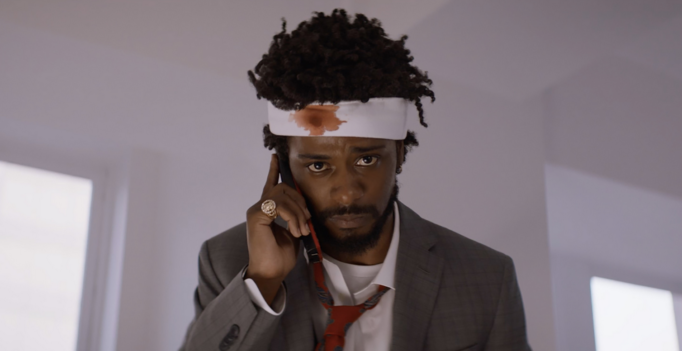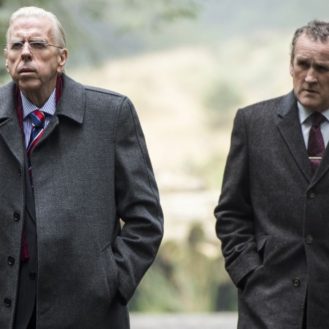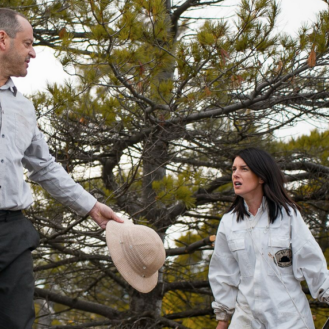By: Trevor Chartrand
Boots Riley’s directorial debut is undoubtedly a memorable satiric comedy, despite being uneven in some places. Sorry to Bother You is a tad ambitious – with plenty of high-concept ideas crammed into its runtime, the overall pacing and consistency of the film suffers a bit as a result. But then again, it’s nice to see a film with too much to say, rather than something so vapid that it says nothing.
Set in a surreal imagining of present-day Oakland, Sorry to Bother You features Lakieth Stanfield as Cassius Green, an everyday schlub living in his uncle’s garage, struggling to make ends meet. He discovers his niche at his new telemarketing job, when he uses his ‘white people voice’ (dubbed by David Cross) to start making big sales. With the promise of a promotion and bigger commissions, Cassius is soon forced to choose between his activist friends and colleagues rallying for fair pay, and the promise of financial success beyond his wildest dreams.
Now, this summary barely scratches the surface of the themes and ideas within the full-to-bursting narrative that is Sorry to Bother You. This satire also examines topics like slavery, corporate greed, artistic integrity, and even genetic experimentation/mutation. It’s a lot to unpack in a 105-minute movie.
The visual style of the film is unique beyond anything you’d expect from this kind of comedy. A lot of effort and thought was clearly put into each sequence. In telemarketing scenes, for example, Cassius’ desk sinks through the floor and into the living room of anyone he’s calling, so he can look them in the eye for his pitch. The exclusive elevator for the top floor telemarketers is literally made of gold. The visual flourishes are stylish and funny, while at the same time maintaining the themes and tone of the story.
The jokes in the film aren’t as in-your-face as a typical summer comedy. There’s no rapid-fire series of jokes at the expense of each character. Instead the comedy stems more from the hyperbolic reality of each situation. It’s like looking at a distorted mirror of society – exaggerated but authentic. The laughs are intended to draw attention to the problems with the systems in place, and it works quite effectively. Sorry to Bother You is not only funny, but also reflective.
For all of its twists and turns, I’d say there’s one unexpected reveal in Sorry to Bother You that would either make or break the film for some audiences. While the scene worked for me, I can see it being overwhelming for others and pushing the boundaries of the surreal world a little too far. Depending on your tolerance for absurd and shocking humor, this sharp left turn may be the straw that breaks the camel’s back for some audiences.
And for every narrative turn in this film, there’s a surprise cast member to match it. The film features small roles from a ton of seasoned actors including Danny Glover, Terry Crewes, Armie Hammer, Patton Oswalt and Forest Whitaker. As Cassius Green, Lakieth Stanfield does an incredible job evolving the character from a slouch with no job to a successful salesman; nthe development of his confidence and body language is noteworthy. Cassius is grounded by his abstract artist girlfriend Detroit (Tessa Thompson) and his best friend Salvador (Jermaine Fowler), and both actors have a salt-of-the-earth sincerity that effectively challenge Cassius to keep it real.
Whether you’re watching it for the political commentary or for just for the laughs, Sorry to Bother You is a fun, smart film with a lot to offer – bursting with original ideas, unique visuals, and strong performances. This film has an unmatched style that’s truly its own, and it’s definitely worth a watch.
**********
Do You Tweet? Follow These Tweeple:
Trevor Chartrand: @OhHaiTrebor





Leave a comment